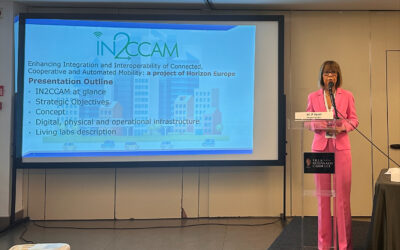One of the main challenges of the IN2CCAM project is to offer solutions based on Connected, Cooperative, and Automated Mobility, which genuinely address the citizen’s needs. In this context, the project holds a significant vision of enhancing inclusivity in transportation. As a first step, the IN2CCAM consortium conducted an extensive survey involving more than 500 participants to gain insights from distinguished groups. The results will help the partners tailor suitable services in each Living Lab, ensuring it aligns with the research findings.
Although acknowledging the complexity of each individual, the study defines eight different user groups, considering aspects such as socioeconomic or demographic, seeking to cover all vulnerable populations.
It thus defines the following categories:

Additionally, the study identifies four core requirements that drive passengers’ behaviour, known as the Four A’s: Availability, which refers to transport options and frequencies; Accessibility, which relates to how reachable users find different transport modes and how accurate the information that they are provided with; Affordability, a crucial aspect to reach inclusiveness; and Acceptability, which depends on relevant factors like safety or comfort.
Unlocking the unique needs of every user group
Once these study criteria have been defined and after an exhaustive analysis of the data, these are some of the main outcomes:
The survey results shed light on low-income employees’ labour market, often characterised by nonstandard working hours. Together with unemployed people, they share a clear preference for using public transport. The priorities for this group are suitable public transport options that enable commuting in night shifts, weekends or irregular working hours and affordable alternatives that do not compromise their mobility. On-demand services and economical shared mobility options will contribute to overcoming these groups’ transportation barriers.
The main finding regarding senior citizens is their reluctance to adapt to new transport models, which may affect their acceptance towards automated mobility. Effective awareness campaigns that convey the benefits of this new model and its positive impact on efficiency and increased safety will contribute to ensuring endorsement.

According to the IN2CCAM study, the migrant community, and ethnic minorities face obstacles such as language or cultural barriers, which can compromise a more accessible use of public transport. Consequently, when possible, they tend to prioritise the use of private vehicles. New transport models have the potential to help reduce these challenges and encourage greater inclusion of these groups. Among the solutions, providing readable, easy-to-understand information will enhance accessibility.
When addressing individuals with disabilities, it is crucial to recognize the diversity within this group, comprising individuals with varying types and degrees of disabilities. Over half of the interviewed individuals from this group expressed their preference towards private cars. However, they hold a positive perception of automated mobility and CCAM, believing it will enhance travel by making it more comfortable and efficient.

The primary characteristic of the young people and children group is their economic vulnerability, leading to a dependence on public transportation. As a currently overlooked but determinant group for the future of mobility, it is crucial to involve them in the decision-making process to tailor suitable solutions.

Regarding a gender-based approach, IN2CCAM research showcases that women and people from other gender-related minorities present different mobility patterns, needs and behaviours. Safety and security are two critical aspects sought by this group, as they claim to feel unprotected from gender and homophobic-based violence and discrimination in public transport. Automated mobility becomes a conflict for them, as they fear they will be less protected if the driver is missing. There is a need to advance effective solutions within the CCAM ecosystem that ensure their safety.
While many smart transportation and mobility solutions mainly focus on urban centres due to their population growth, it’s essential to extend CCAM solutions to people living in urban areas. Promoting new transportation options, such as Demand-Responsive Transport (DRT), can significantly improve efficiency and sustainability in these areas, reducing the reliance on private vehicles.
Connected and automated mobility is intricately tied to technology. The developed CCAM services should aim to bridge the gap for users lacking IT literacy or with internet limitations. Encouraging the development of digital skills among this group will contribute to preventing their exclusion.
“Passenger needs can be met by addressing four transportation determinants: availability, accessibility, affordability, and acceptability. To ensure that future systems are inclusive and equitable, we need to fundamentally change the way we design them. We need to move away from traditional approaches that are based on the needs of a ‘reference man’, which is typically a young, white, healthy, and full-time employed man”, states Christos Ballis, Scientific Project Manager at ICCS, the project partner leading this research.
By understanding the unique needs of diverse user groups, IN2CCAM aims to make connected, cooperative, and automated mobility truly inclusive. The study identifies key priorities such as safe and accessible transportation and addresses challenges like financial sustainability and privacy concerns. It highlights the importance of moving away from traditional, uniform approaches, and underscores the need to design transportation systems that cater to the real-life complexities and preferences of all individuals, ensuring inclusive mobility for all.




